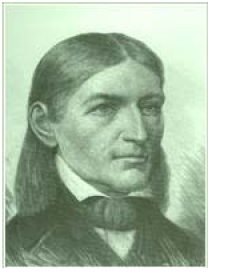Friedrich Froebel (1782–1852) developed a series of educational principles and practices centred around the idea that young children learn by playing. In his native Germany, he developed an activity based approach to teaching young children involving playing with objects, singing, dancing and gardening which in 1840 he named the Kindergarten or ‘child’s garden’. Froebel gives an example of active learning pedagogy at work for kindergarten children.

For [one such] play the children stand in a circle; the ball has just moved from one child to another, and has thus called forth the desire for locomotion in the child. I might say that one can feel this in the children, even in one particular child. Remarking this, let the wandering of the ball cease, and while drawing the child by hand into the middle of the circle, express the observation just made, ‘Lina (or Adolph, for example) wishes also to walk about.’
Or if the kindergarten [teacher] perceives that the wandering of the ball no longer enchains the attention of the children, let her awaken the slumbering inclination of the children this question,
‘Will not one of you also walk about?’
We have never yet asked this question that several children have not at the same time stepped forth and called out, ‘I,’ ‘I’, ‘I’.
The [teacher] now sings to the play-circle:
‘Our Lina [Adolph] like to walk
From one place [child] to another.’
Or from the heart and lips of the child itself come the words:
‘I, too, would like to walk’, etc.
While the child who desires to walk steps up to any one in the circle, reaches his hand to that one and moves relatively to himself from the right to the left, but relatively to the circle of children from the left to the right hand; to children sing:
‘Our Lina (Adolph) you see will walk
From one place to another.’
As the walking child holds out the right hand, each child in the circle responds by extending the right hand toward him.
Smaller children can, at the first, be permitted to go round merely with this silent offering of the hand; but the next time, or even at once with larger children, the greeting may be added:
‘And wish you a good day, good day,
Good day, good day, good day.’
Or the song proceeds from the children in the circle:
‘And wish us a good day, good day’, etc.
The children play this game very willingly. When one child has ended his walking, several more always step forward who wish to ‘walk’ in the same way. It is of course, understood that the leader must see that all the children have walked at the close of the play.
An extension of this play may be added at the close of the walking of each child, by asking the child, who has again placed himself in the middle:
‘Whom have you then learned to know on your journey?’
As an answer to this, the child must mention the names of the children standing in the circle. This brings about a double exercise: it teaches him not to pass by objects without observing them, and also helps him to form a definite conception of the name of the object and its qualities, or at least its general impression.
Froebel, Friedrich. 1895 [1985]. Friedrich Froebel’s Pedagogics of the Kindergarten: Or, His Ideas Concerning the Play and Playthings of the Child. New York: D. Appleton. pp. 244–246. || WorldCat
